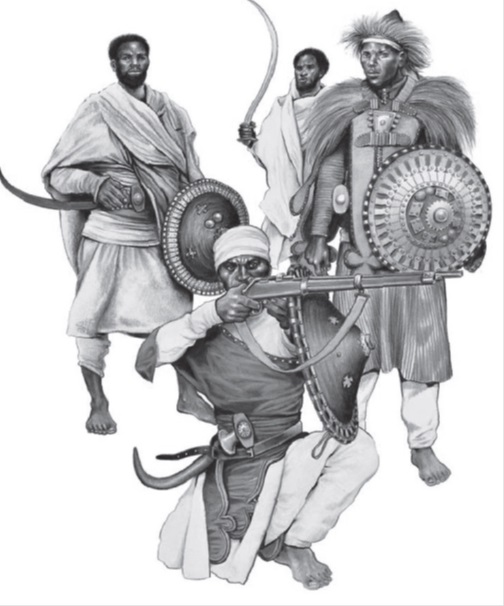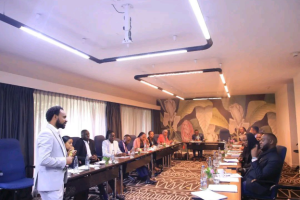
BY MEHARI BEYENE
Book title: Emperor Menelik II
(The military strategist and diplomat who changed the course of history)
Author: Tilahun Tassew
Published by: Kuraz Printing Press PLC
Price: 145.00 Birr
Here is a history book that particularly placed focus on the military strategy of Ethiopia at the time of Menelik the second. Of course, several scholars and books as well as newspapers did give gratitude for Menelik the second, for his capability and ability in military tactics and techniques. Regarding Menelik the second’s capabilities, Minneapolis Journal stated, “this is one African king who is highly respected by all the great powers of Europe. He has a standing army of 150,000 men, and in 1895, when Italy tried to annex one of his provinces; she was badly defeated in a few months.”
Author Tilahun Tassew has also illustrated to readers in his book entitled Emperor Menelik the second, concerning the role of Menelik the second in the battlefield. The book concentrates mainly on the military and diplomatic aspects of the Emperor’s era. He described Menelik as, “he will be remembered in history as a powerful African king who unified Ethiopia and badly defeated the Italians when they tried to invade his country by annexing his Northern Province, Tigray. The extraordinary nature and achievement of Emperor Menelik was not confined to the military and diplomatic aspects.
In defying the European colonizers, the book mentioned that Menelik rejected the Berlin and Brussels conferences agreement between European colonial powers to divide Africa into sphere of interest. The victory of Menelik at Ambalage, Mekelle, Awsa and Adwa were possible with his efforts of unifying the Ethiopian people and modernizing his army.
Tilahun stated in his book Menelik was also good at tempting the Italians to go outside of the fortress and confront his army by feeding them misinformation. Menelik had done an outstanding task of unifying Ethiopia through means of non-religious strategy to bring unification of Harargie under Shewan kingdom.
In improving logistical framework, the author stated that Menelik for the first time in Ethiopian history established a logistical center for providing nourishment for the soldiers and family members going to battle. Thousands of men and women were assigned to remain in Woreilu to prepare dry foods and traditional winery. Provisions were transported to the battle front in the north on the back of mules and donkeys and sometimes by people. This gained the support of the local people where battles were undertaken.
In National Participatory Development, the book noted that Menelik was keen on developing trade and introducing modern technologies and participatory development. Menelik was also determined to introduce new technologies to his country going as far as threatening to go to war with those countries which try to sabotage his efforts. Menelik involved citizens in development endeavors. The money for building the railway was collected by ordering every household to contribute one Maria Theresa Birr per cattle. He built also the first bullet manufacturing and weapon maintenance firm.
Concerning land reform and salaried soldiers, the author pointed out in his book that Menelik made a land reform which redistributed land to every Shoan person and made their tenure a rist. Menelik’s success against the colonialists among others was the result of modern weaponry and army. At that time, Ethiopia needed weaponry, scholarship for its students, training of its soldiers and provision of technicians and medical personnel. Menelik also developed intimate relationship with Czar Nicholas 2 and his officials and family. As the result, Menelik used to address Czar Nicholas as brother and benefactor. The Czar continued assisting Ethiopia in weaponry and training even during the Italian invasion.
The book remarked that Menelik II also built his military arsenal exploiting the competition between the French on one side and Britain and Italy on the other side. He had also bought different weapons from many countries but Russia and France were generous. Menelik II also mentioned his army keeping its traditional valor. He made his army to adopt European tactics of camouflaging and handling modern European equipment while keeping the traditional structure, organization and keeping the traditional rank and order. His special forces were trained by soldiers from Russia and France. The Emperor himself was well acquainted with the weapons which he planned to buy by gathering information from the Europeans or by examining the special weapons sent to him as a gift or requiring traders to bring samples before he approves procurement order. Generally speaking, it is irrational not to appreciate Menelik II’s modernization of its army, introduction of modern technology and infrastructure outside his brilliant diplomatic endeavor.
Regarding the importance of military and development, Tilahun mentioned that the relationship between diplomacy, military and development efforts in military and diplomatic history. For powerful nations, the military is an instrument to push forward what has failed diplomatically. On the other hand, military power depends on the level of economic development of a given country. For Menelik II, diplomacy was an instrument to build his armaments and the military was for forcing the colonial powers to open their ports and allow the introduction of modern technology and infrastructure. Menelik II also developed diplomatic relation with USA which impressed him with its interest in trade and development.
In building international public relations and trade, the author mentioned that Menelik II’s international public relations were not conducted through generals and ambassadors reciprocating the Europeans in his capital alone. Ethiopian students attending trainings in European countries were also serving as freelance diplomats. In short, Emperor Menelik II, within a span of twenty years on the Ethiopian throne transformed Ethiopia into a respectable country in the international arena. He set the country in the direction of peace and development. He had unified most of the East African kingdoms and ethnic groups and led them to ward off European colonizers. Whether living in the occupied territories of the free part in Ethiopia the East Africans were able to assert their history which was the shining star of the ancient world.
The Ethiopian Herald March 19/2021





